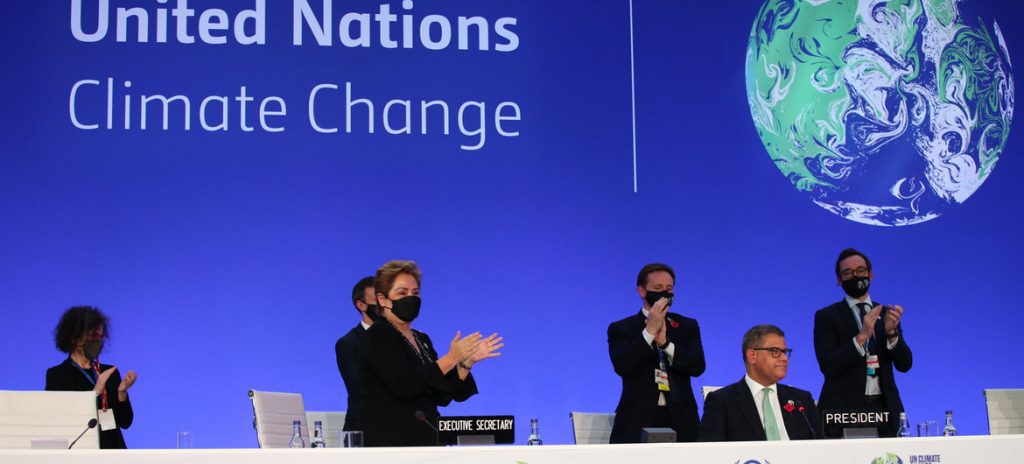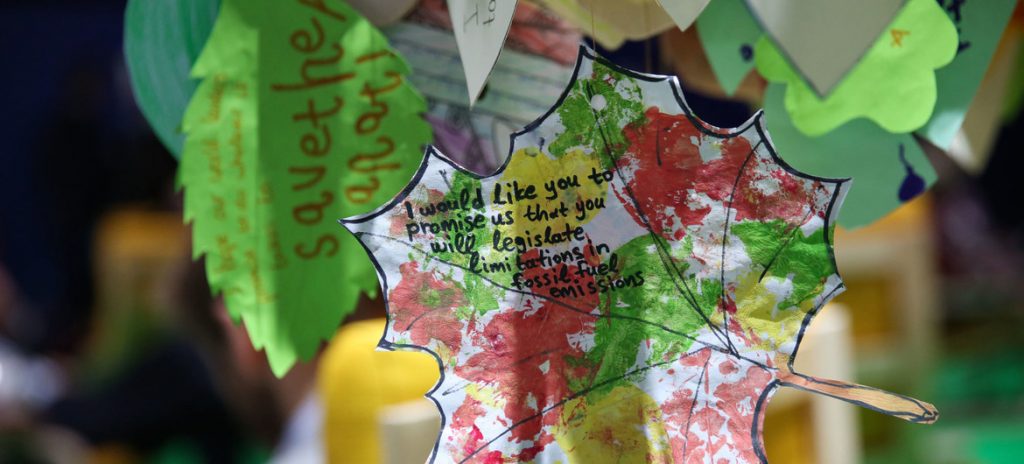
COP26 closes with ‘compromise’ deal on climate, but it’s not enough, says UN chief
13 November 2021, UN HQ
After extending the COP26 climate negotiations an extra day, nearly 200 countries meeting in Glasgow, Scotland, adopted on Saturday an outcome document that, according to the UN Secretary-General, “reflects the interests, the contradictions, and the state of political will in the world today”.
“It is an important step but is not enough. We must accelerate climate action to keep alive the goal of limiting global temperature rise to 1.5 degrees”, said António Guterres in a video statement released at the close of the two-week meeting.
The UN chief added that it is time to go “into emergency mode”, ending fossil fuel subsidies, phasing out coal, putting a price on carbon, protecting vulnerable communities, and delivering the $100 billion climate finance commitment.
“We did not achieve these goals at this conference. But we have some building blocks for progress,” he said.
Mr. Guterres also had a message to young people, indigenous communities, women leaders, and all those leading the charge on climate action.
“I know you are disappointed. But the path of progress is not always a straight line. Sometimes there are detours. Sometimes there are ditches. But I know we can get there. We are in the fight of our lives, and this fight must be won. Never give up. Never retreat. Keep pushing forward”.
A snapshot of the agreement
The outcome document, known as the Glasgow Climate Pact, calls on 197 countries to report their progress towards more climate ambition next year, at COP27, set to take place in Egypt.
The outcome also firms up the global agreement to accelerate action on climate this decade.
However, COP26 President Alok Sharma struggled to hold back tears following the announcement of a last-minute change to the pact, by China and India, softening language circulated in an earlier draft about “the phase-out of unabated coal power and of inefficient subsidies for fossil fuels”. As adopted on Saturday, that language was revised to “phase down” coal use.
Mr. Sharma apologized for “the way the process has unfolded” and added that he understood some delegations would be “deeply disappointed” that the stronger language had not made it into the final agreement.
By other terms of the wide-ranging set of decisions, resolutions and statements that make up the outcome of COP26, governments were,among other things, asked to provide tighter deadlines for updating their plans to reduce emissions.
On the thorny question of financing from developed countries in support of climate action in developing countries, the text emphasizes the need to mobilize climate finance “from all sources to reach the level needed to achieve the goals of the Paris Agreement, including significantly increasing support for developing country Parties, beyond $100 billion per year”.

Patricia Espinosa, Executive Secretary of the UN Framework Convention on Climate Change (standing near left), and Alok Sharma President for COP26 (seated centre), at the closing of the UN Climate Conference in Glasgow, Scotland.
1.5 degrees, but with ‘a weak pulse’
“Negotiations are never easy…this is the nature of consensus and multilateralism”, said Patricia Espinosa, the Executive Secretary of the United Nations Framework Convention on Climate Change (UNFCCC).
She stressed that for every announcement made during the past two weeks, the expectation is that the implementation “plans and the fine print” will follow.
“Let us enjoy what we accomplished but also prepare for what is coming,” Ms. Espinosa said, after recognizing the advancements on adaptation, among others.
Meanwhile, COP26 President Alok Sharma stated that delegations could say “with credibility” that they have kept 1.5 degrees within reach.
“But its pulse is weak. And it will only survive if we keep our promises. If we translate commitments into rapid action. If we deliver on the expectations set out in this Glasgow Climate Pact to increase ambition to 2030 and beyond. And if we close the vast gap that remains, as we must,” he told delegates.
He then quoted Prime Minister Mia Mottley, who earlier in the conference had said that for Barbados and other small island states, ‘two degrees is a death sentence.’ With that in mind, Mr. Sharma asked delegates to continue their efforts to get finance flowing and boost adaptation.
He concluded by saying that history has been made in Glasgow.
“We must now ensure that the next chapter charts the success of the commitments we have solemnly made together in the Glasgow Climate Pact, he declared.
The ‘least worst’ outcome
Earlier during the conference’s final stocktaking plenary, many countries lamented that the package of agreed decisions was not enough. Some called it “disappointing”, but overall, said they recognized it was balanced for what could be agreed at this moment in time and given their differences.
Countries like Nigeria, Palau, the Philippines, Chile and Turkey all said that although there were imperfections, they broadly supported the text.
“It is (an) incremental step forward but not in line with the progress needed. It will be too late for the Maldives. This deal does not bring hope to our hearts,” said the Maldives’ top negotiator in a bittersweet speech.
US climate envoy John Kerry said the text “is a powerful statement” and assured delegates that his country will engage constructively in a dialogue on “loss and damage” and adaptation, two of issues that proved most difficult for the negotiators to agree upon.
“The text represents the ‘least worst’ outcome,” concluded the top negotiator from New Zealand.
A snapshot of the agreement
The outcome document, known as the Glasgow Climate Pact, calls on 197 countries to report their progress towards more climate ambition next year, at COP27, set to take place in Egypt.
The outcome also firms up the global agreement to accelerate action on climate this decade.
However, COP26 President Alok Sharma struggled to hold back tears following the announcement of a last-minute change to the pact, by China and India, softening language circulated in an earlier draft about “the phase-out of unabated coal power and of inefficient subsidies for fossil fuels”. As adopted on Saturday, that language was revised to “phase down” coal use.
Mr. Sharma apologized for “the way the process has unfolded” and added that he understood some delegations would be “deeply disappointed” that the stronger language had not made it into the final agreement.
By other terms of the wide-ranging set of decisions, resolutions and statements that make up the outcome of COP26, governments were,among other things, asked to provide tighter deadlines for updating their plans to reduce emissions.
On the thorny question of financing from developed countries in support of climate action in developing countries, the text emphasizes the need to mobilize climate finance “from all sources to reach the level needed to achieve the goals of the Paris Agreement, including significantly increasing support for developing country Parties, beyond $100 billion per year”.

COP26 attendants hang promises and petitions to world leaders in the form of leaves of different colors at the Climate Conference in Glasgow, Scotland.
Other key COP26 achievements
Beyond the political negotiations and the Leaders’ Summit, COP26 brought together about 50,000 participants online and in-person to share innovative ideas, solutions, attend cultural events and build partnerships and coalitions.
The conference heard many encouraging announcements. One of the biggest was that leaders from over 120 countries, representing about 90 per cent of the world’s forests, pledged to halt and reverse deforestation by 2030, the date by which the Sustainable Development Goals (SDGs) to curb poverty and secure the planet’s future are supposed to have been achieved.
There was also a methane pledge, led by the United States and the European Union, by which more than 100 countries agreed to cut emissions of this greenhouse gas by 2030.
Meanwhile, more than 40 countries – including major coal-users such as Poland, Vietnam and Chile – agreed to shift away from coal, one of the biggest generators CO2 emissions.
The private sector also showed strong engagement with nearly 500 global financial services firms agreeing to align $130 trillion – some 40 per cent of the world’s financial assets – with the goals set out in the Paris Agreement, including limiting global warming to 1.5 degrees Celsius.
Also, in a surprise for many, the United States and China pledged to boost climate cooperation over the next decade. In a joint declaration they said they had agreed to take steps on a range of issues, including methane emissions, transition to clean energy and decarbonization. They also reiterated their commitment to keep the 1.5C goal alive.
Regarding green transport, more than 100 national governments, cities, states and major car companies signed the Glasgow Declaration on Zero-Emission Cars and Vans to end the sale of internal combustion engines by 2035 in leading markets, and by 2040 worldwide. At least 13 nations also committed to end the sale of fossil fuel powered heavy duty vehicles by 2040.
Many ‘smaller’ but equally inspiring commitments were made over the past two weeks, including one by 11 countries which created the Beyond Oil and Gas Alliance (BOGA). Ireland, France, Denmark, and Costa Rica among others, as well as some subnational governments, launched this first-of-its kind alliance to set an end date for national oil and gas exploration and extraction.
A quick refresher on how we got here
To keep it simple, COP26 was the latest and one of the most important steps in the decades long, UN-facilitated effort to help stave off what has been called a looming climate emergency.
In 1992, the UN organized a major event in Rio de Janeiro called the Earth Summit, in which the UN Framework Convention on Climate Change (UNFCCC) was adopted.
In this treaty, nations agreed to “stabilize greenhouse gas concentrations in the atmosphere” to prevent dangerous interference from human activity on the climate system. Today, the treaty has 197 signatories.
Since 1994, when the treaty entered into force, every year the UN has been bringing together almost every country on earth for global climate summits or “COPs”, which stands for ‘Conference of the Parties’.
This year should have been the 27th annual summit, but thanks to COVID-19, we’ve fallen a year behind due to last year’s postponement – hence, COP26.
Read the full article here.